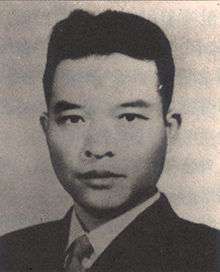Kim Won-bong
| Kim Won-Bong | |
|---|---|
 | |
| Deputy Commander of the Korean Liberation Army | |
|
In office 1941–1945 | |
| Succeeded by | Position abolished |
| Personal details | |
| Born |
13 August 1898 Miryang, Gyeongsangnam-do milyanggun (now Miryang, South Korea) |
| Died |
c. 1958 North Korea |
| Nationality | Korean |
| Political party | Independent (anarchist) |
| Spouse(s) |
Park Cha-jeong Choi Dong-Seon |
| Children |
Kim Cheol-Geon Kim Joong-Geon Kim Hak-Bong |
| Occupation | Politician, military general |
| Military service | |
| Allegiance | DPR Korea |
| Service/branch | Korean Liberation Army |
| Years of service | 1941-1945 |
| Rank | General |
| Battles/wars | World War II |
Kim Won-bong (김원봉, 金元鳳, August 13, 1898 – c.1958) was a Korean anarchist, independence activist, and statesman from North Korea.
Biography
Kim Won-bong was born on September 28 (August 13 in lunar calendar), 1898 in Miryang, Gyeongsangnam-Do province, Korea. His father was Kim Ju-Ik and his mother was Lee Gyeong-Nyeom. Lee died while giving birth to Kim Won-bong's brother, Kyung-Bong. Kim created a Korean nationalist underground organization known as the Korean Heroic Corps (의열단; 義烈團), and became its leader.[1] After assuming the leader position of the Heroic Corps, Kim Won-Bong found that he could not accomplish what the Heroic Corps set out to do as the organization did not have a sufficient number of members. As a result, he joined the Whampoa Military Academy in 1926. He used the pseudonym 'Choi Rim' and organized the Korean National Revolutionary Party and the Joseon Communist Reconstruction Party.[2]
The Korean National Revolutionary Party was formed in Shanghai in 1935 by a group of left-wing nationalist Korean parties, organized by Kim Kyu-sik, Kim Won-Bong and Cho Soang.[3] On July 10th, 1937, he went to Lushan, the Chinese governor's conference site and resort, at the invitation of the Government of the Republic of China. During that time, Chinese governors insisted upon associating the united front against Japanese Imperialism. Before his return, Won-bong received extensive funding from the Chinese governor.[4]
Kim Won-Bong served as the deputy commander of the Korean Liberation Army (한국 광복군) of the Provisional Government of the Republic of Korea. After Korean Independence, he returned to Korea with Provisional Government of the Republic of Korea's governors on December 3rd. After the liberation, he attended a meeting with Kim Gu, and Kim Kyu-sik, Pak Hon-Yong.
Kim Won-Bong married twice. His first wife Choi Dong-seon died early. After her death, he married Park Cha-jeong. He had two sons and one daughter: Kim Cheol-Geon (김철건) , Kim Joong-Geon (김중건) and Kim Hak-Bong (김학봉). His pen name was "Yaksan" (약산 若山), which means "like a mountain"
In 1958, he was purged by Kim Il-Sung, and there are many accounts of Kim's death. According to one, Kim committed suicide by taking cyanide.[5]
Organization of the Heroic Corps
On February 1919, he entered the Shinheung Military Academy (Hangul: 신흥무관학교; Hanja: 新興武官學校) and underwent military education for six months. He later dropped out of the academy, and on November 9th, he organized the Heroic Corps with Yang Gun-ho, Gwak Jae-ki, Han Bong-geun, Kim Ok, and others. Among the Heroic Corps' aims were the assassination of Japanese officials and their collaborators, coupled with attacks on Japanese bases.
See also
- Heroic Corps
- Korean Volunteers Army
References
| Wikimedia Commons has media related to Kim Won-bong. |
- ↑ "The Academy of Korean Studies(한국학중앙연구원) : Kim Won-Bong(김원봉)".
- ↑ [이우탁(Lee Woo-tak) (2006). 《김구, 장보고, 앙드레김(Kim Gu, Jang Bo-Go, André Kim)》.동아시아(East-Asia). 142p]
- ↑ Pratt, Keith L.; Rutt, Richard (1999), "Korean National Revolutionary Party", Korea: A Historical and Cultural Dictionary, Psychology Press, p. 236, ISBN 978-0-7007-0464-4, retrieved 2016-03-20
- ↑ "The Academy of Korean Studies(한국학중앙연구원) : Kim Won-Bong(김원봉)".
- ↑ "[박용배 칼럼] 김원봉과 나혜석"